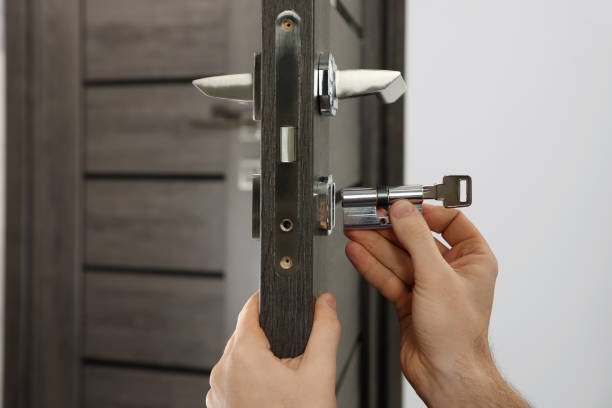How to Become a Professional Locksmith and Create Your Successful Business
Chapter 1: Introduction to the Locksmithing Profession
Locksmithing is an ancestral trade that has evolved with the times. Far from the image of a simple craftsman who makes keys, the modern locksmith is a versatile professional who masters both traditional techniques and high-tech security solutions. In a world where the security of property and people is paramount, the skills of a qualified locksmith are always in demand.
Becoming a locksmith means choosing a future-proof profession that offers great professional freedom. Whether you want to work for an established company or create your own business, the opportunities are numerous. In many countries, the locksmithing sector represents a stable market with constant demand, whether for new installations, renovations, or emergency interventions.
This comprehensive guide will accompany you through each step of your professional journey: from learning the technical basics to creating and developing your own locksmithing business. We will cover available training, necessary certifications, legal and commercial aspects, as well as strategies to succeed in this competitive sector.
For more specialized information and resources on locksmithing and security solutions, visit Iron-Metal.com, your comprehensive resource for locksmithing expertise.
Chapter 2: Skills and Qualities Required
Technical Skills
To excel in the locksmithing profession, certain technical skills are essential:
- Mastery of different types of locks: cylinders, mortise locks, electronic locks, etc.
- Knowledge of materials: steel, brass, aluminum, and their specific properties
- Carpentry and metalwork skills: for door and window installation and repair
- Mastery of fine opening techniques: for damage-free emergency openings
- Electronics knowledge: for modern security systems (digital keypads, magnetic cards)
- Understanding of security standards: industry certifications and regional standards
Personal Qualities
Beyond technical skills, certain personal qualities will make the difference:
- Meticulousness and precision: essential for handling complex mechanisms
- Honesty and integrity: you will have access to private places and sensitive information
- Responsiveness and availability: emergencies represent a significant part of the activity
- Customer service orientation: knowing how to reassure and advise sometimes stressed clients
- Adaptability: each intervention presents unique challenges
- Organization: to efficiently manage your time and resources
- Stress resistance: especially during emergency interventions
These qualities will be particularly important when you become an entrepreneur, as you will not only have to practice your trade but also manage all aspects of your business.
For insights from industry professionals about the essential qualities for success, check out expert advice at Iron-Metal.com.
Chapter 3: Training to Become a Locksmith
Official Qualifications
In many countries, several training paths allow you to acquire the necessary skills to become a locksmith:
- Certificate in Locksmithing/Metalwork: basic training to acquire fundamental skills
- Vocational Diploma in Building Works/Metalwork: training that deepens technical knowledge
- Professional Certificate in Locksmithing/Metalwork: accessible after a certificate, it strengthens skills and prepares for business management
- Advanced Technical Certificate in Building Envelope: for more technical aspects and design
These trainings combine theoretical and practical teachings, often alternating between a training center and a company.
Complementary Training
To specialize or broaden your skills, several complementary training options exist:
- Electronic security system training: to master electronic and connected access systems
- Manufacturer certifications: offered by major lock and security system brands
- Home automation training: for the installation of smart systems
- Business management training: essential for future entrepreneurs
Apprenticeship
Apprenticeship is a preferred way to enter the profession. It allows you to gain concrete experience while following theoretical training. The advantages are numerous:
- Rapid acquisition of practical skills
- Immersion in the daily reality of the profession
- Remuneration during training
- Contact with a professional network
- High employment rate after training
Many locksmithing companies recruit apprentices, and this formula can be an excellent springboard for later creating your own business.
Browse comprehensive training resources and continuing education opportunities at Iron-Metal.com.
Chapter 4: Gaining Professional Experience
Working as an Employee
Before launching as an entrepreneur, it is strongly recommended to gain experience as an employee. This step will allow you to:
- Perfect your technical skills
- Understand market realities
- Learn to manage different types of interventions
- Observe business management methods
- Build a professional network
- Secure your first potential clients
Ideally, work in different structures (small artisanal business, large security company, etc.) to discover various approaches to the trade.
Activity Sectors
As a locksmith, you can work in several sectors:
- Emergency services: door openings, lock changes after burglaries
- Installation and maintenance: equipment for new buildings or renovations
- Industrial locksmithing: installation and maintenance for businesses and public institutions
- Decorative locksmithing: creation of ornamental metal elements (closer to artistic ironwork)
Exploring these different areas will help you identify the one in which you wish to specialize when you create your company.
Industry insights and job opportunities can be found at Iron-Metal.com, connecting experienced professionals with promising career pathways.
Chapter 5: Certification and Qualifications
Professional Certifications
To enhance your expertise and reassure your future clients, certain certifications are recommended:
- Quality Certifications: recognizes the know-how and professionalism of building companies
- Security Certifications: reference standards for high-security locks
- Professional Labels: guarantees a level of quality and professional ethics
- Industry-Specific Certifications: for the installation of security systems
These certifications constitute a guarantee of quality and can make a difference against the competition.
Continuing Education
The locksmithing profession constantly evolves with technological innovations. Continuing education is therefore essential to:
- Stay updated on new technologies (connected locks, biometric systems)
- Maintain your certifications
- Develop new skills
- Comply with regulatory changes
Budget time and money for regular training throughout your career.
Visit Iron-Metal.com for the latest industry certifications and standards updates to keep your skills current.
Chapter 6: Launching as an Independent Locksmith
Choosing Your Legal Status
Before launching, you will need to choose the legal status most suited to your situation:
- Sole Proprietorship: ideal for starting with simplified procedures and light accounting
- Limited Liability Individual Enterprise: to protect your personal assets
- Limited Liability Company: suitable if you plan to hire quickly
- Simplified Joint Stock Company: offers great flexibility in organization
Each status presents advantages and disadvantages in terms of taxation, social protection, and legal responsibility. Consult an accountant to make the choice most adapted to your situation.
Administrative Procedures
To create your independent locksmith activity, several procedures are necessary:
- Registration: with the appropriate trade chamber or business registry
- Professional insurance: professional liability, decennial warranty, multi-risk
- Opening a professional bank account
- Activity declaration: with tax services
- Affiliation with social organizations: for your social protection
Don’t hesitate to seek support from your local business chamber, which often offers business creation assistance services.
For guidance on legal considerations specific to the security industry, consult expert articles at Iron-Metal.com.
Chapter 7: Creating Your Locksmithing Business
Developing Your Business Plan
A solid business plan is essential to clarify your project and convince potential financiers. It should include:
- Market study: analysis of local competition, identification of needs
- Service offering: detail of proposed services and positioning
- Commercial strategy: how to attract and retain customers
- Necessary resources: equipment, vehicle, premises, personnel
- Financial forecast: initial investments, projected turnover over 3 years
- Financing plan: personal contribution, loans, potential aids
Material Investments
To start your activity, several investments are necessary:
- Specific tools: picks, extractors, key cutting machines, etc.
- Stock of consumables: locks, cylinders, blank keys
- Professional vehicle: ideally set up as a mobile workshop
- Computer equipment: for administrative and commercial management
- Commercial premises: depending on your strategy (some locksmiths work only on the move)
Plan an initial budget of approximately $15,000 to $30,000 for complete equipment.
Business Creation Aids
Several programs can help you finance your project:
- Unemployment benefits for business creators
- Interest-free loans from support networks
- Business creation loans from financial institutions
- Regional or local aids specific to crafts
Inquire with your local business chamber to know all the aids you may be eligible for.
Access business planning templates and investment calculators at Iron-Metal.com to help structure your new venture effectively.
Chapter 8: Marketing and Customer Development
Building Your Brand Image
In a competitive sector like locksmithing, a strong brand image is paramount:
- Memorable company name: evoking trust and professionalism
- Logo and graphic charter: to use on all your materials (vehicle, business cards, website)
- Professional attire: to be identifiable and inspire confidence
- Clearly displayed values: honesty, responsiveness, service quality
Local Communication Strategy
To make yourself known locally, several actions are effective:
- Local listing on Google My Business: essential to be found during emergency searches
- Professional website: presenting your services, testimonials, and service area
- Social media: to share your achievements and advice
- Local partnerships: with real estate agencies, property managers, insurance companies
- Membership in professional associations: for credibility and networking
- Local advertising: directories, local newspapers, event sponsorship
Retaining Your Clientele
Customer retention is crucial for developing a sustainable business:
- Impeccable service: punctuality, neat work, transparent quotes
- Follow-up after intervention: check-up call a few days after
- Maintenance contracts: to ensure regular income
- Referral program: to encourage recommendations
- Newsletter with security tips: to stay in your clients’ minds
A satisfied customer is your best ambassador in this profession based on trust.
Discover effective marketing strategies and customer retention tools at Iron-Metal.com to help grow your locksmith business.
Chapter 9: Managing Administrative and Financial Aspects
Daily Management
Good administrative management is essential for the sustainability of your business:
- Quotes and invoices: issued quickly and compliant with regulations
- Payment tracking: follow-up on unpaid invoices
- Inventory management: to avoid shortages or overstocking
- Intervention planning: optimization of travel
- Tax and social declarations: respect of deadlines
Specific software for craftsmen can facilitate these administrative tasks.
Pricing Your Services
Establishing fair pricing is a delicate exercise:
- Analysis of real costs: material, travel, time spent, fixed charges
- Study of prices practiced by the competition
- Differentiation according to services: emergency, night and weekend, complex installations
- Price transparency: clear display to avoid disputes
Don’t hesitate to financially value your expertise and responsiveness, particularly for emergency interventions.
The Question of Emergency Interventions
Emergency interventions represent a significant part of a locksmith’s activity, but they require specific organization:
- Telephone availability: to answer 24/7 or call transfer system
- On-call duty: if you have employees
- Specific pricing: clearly displayed and explained
- Quick intervention kit: always ready in the vehicle
These interventions can be very profitable but also very constraining for your personal life. Find the right balance.
For templates and software recommendations to streamline your business operations, visit Iron-Metal.com.
Chapter 10: Developing and Evolving Your Business
Recruitment and Management
If your business develops well, you will probably consider recruiting:
- Apprentice: to train the next generation and benefit from hiring aids
- Qualified technician: to respond to growing demand
- Administrative assistant: to free you from office tasks
Recruitment in this sector can be difficult due to the shortage of qualified professionals. Consider approaching training centers to host interns who could become your future collaborators.
Service Diversification
To develop your turnover, several diversification paths are possible:
- Electronic security systems: alarms, video surveillance
- Home automation: connected locks, intelligent access control
- Aluminum joinery: installation of secure doors and windows
- Armor plating: reinforcement of existing openings
- Safes: sale, installation, and opening
This diversification must be accompanied by the necessary training and certifications.
Geographic Expansion
Territorial expansion can take several forms:
- Broadening your intervention area
- Opening a secondary agency
- Franchise development: if your concept is solid
- Partnerships with other craftsmen: to cover a larger territory
Each expansion step must be carefully planned to avoid jeopardizing your business.
Explore case studies of successful business expansion strategies in the security industry at Iron-Metal.com.
Chapter 11: Testimonials from Locksmith Entrepreneurs
Mark, 42, locksmith in London for 15 years
“After 5 years as an employee, I created my company specializing in high-security systems for businesses. The most difficult part was managing emergencies while developing this more planned activity. Today, with two employees, we have found a good balance, and our reputation ensures a full order book.”
Sophie, 35, family locksmithing business in Manchester
“I took over my father’s business by completely modernizing it: internet presence, new electronic security services. Our longevity in the city is our strength, but we must constantly train to remain competitive. My advice: invest in your online visibility, that’s where most clients find us now, even in emergencies.”
Karim, 29, self-employed locksmith in Birmingham
“I started 3 years ago with a small investment. The hardest part is getting known against the big brands. I have focused on service quality and transparent prices. Word of mouth works well, but you have to be patient. I advise beginners to calculate their rates carefully to live properly from their activity.”
Find more inspiring success stories and connect with industry veterans through the community forums at Iron-Metal.com.
Chapter 12: Conclusion and Final Advice
Becoming a locksmith entrepreneur is a demanding but enriching journey, combining technical expertise and entrepreneurial skills. In a sector where trust is paramount, the quality of your work and your professionalism will be your best assets for success.
Key Points to Remember:
- Train yourself solidly: both technically and in business management
- Gain experience before launching
- Build a reputation for excellence: quality comes before quantity
- Invest in your online visibility: it’s essential today
- Stay updated on technological innovations
- Find your specialty to stand out from the competition
- Establish fair prices that value your expertise
- Surround yourself with professionals (accountant, insurer, etc.)
- Plan sufficient cash flow for the first months
Locksmithing is a future-proof profession that offers great prospects for well-prepared entrepreneurs. By following these tips and constantly adapting to market developments, you will put all the chances on your side to create a prosperous and sustainable business.
Remember that your greatest asset will be your reputation: each intervention is an opportunity to demonstrate your professionalism and gain the trust of your clients. It is on this trust that you will build your long-term success.
For ongoing support, industry updates, and professional resources to help you succeed in your locksmithing career, make Iron-Metal.com your go-to resource.
This article was written for informational purposes. Regulations and practices may vary by region. Please consult the professional organizations in your sector for information specific to your situation.


